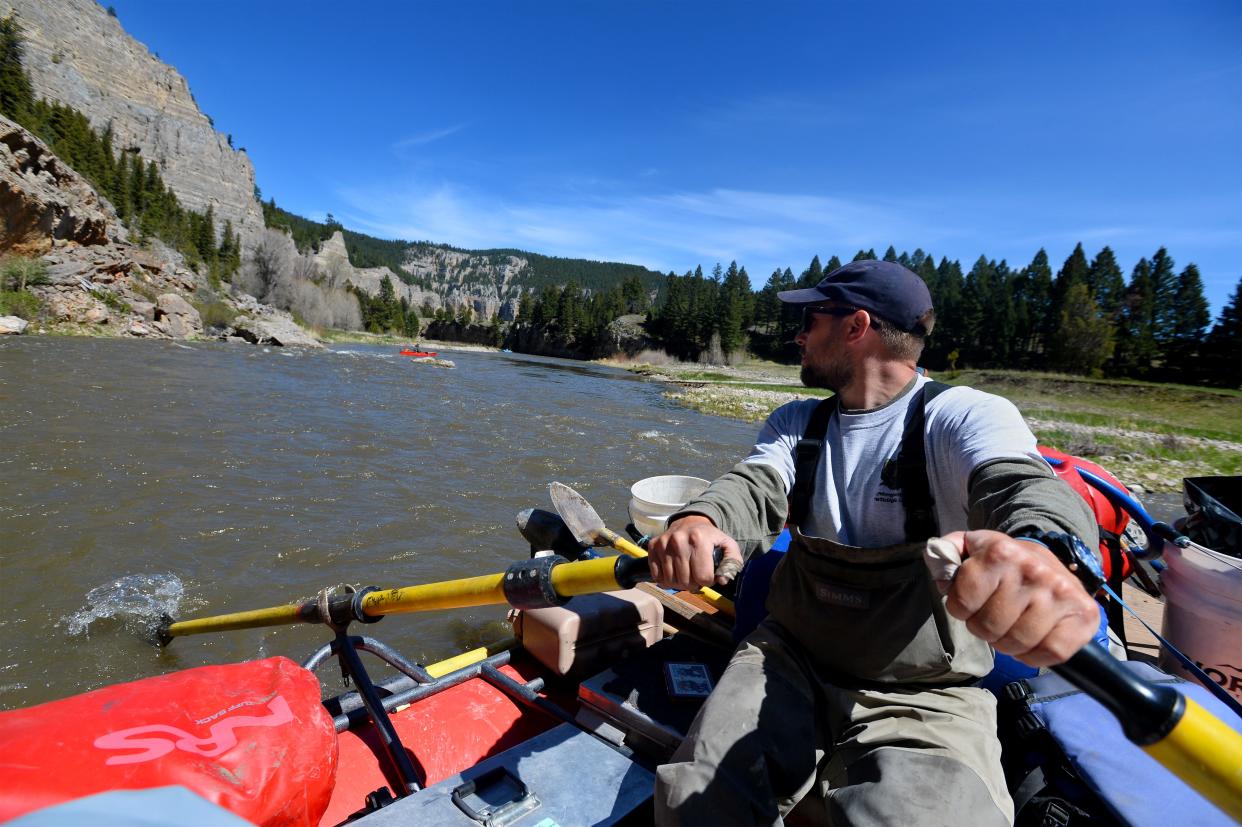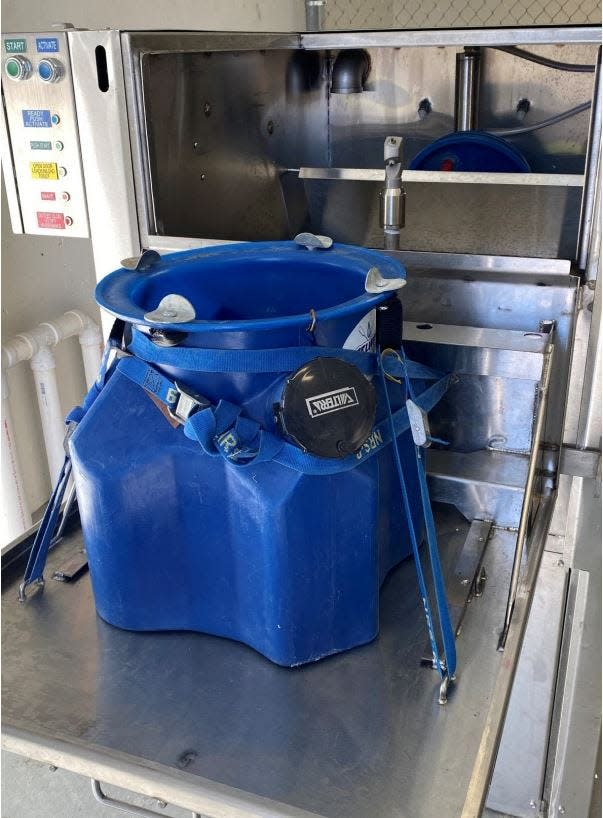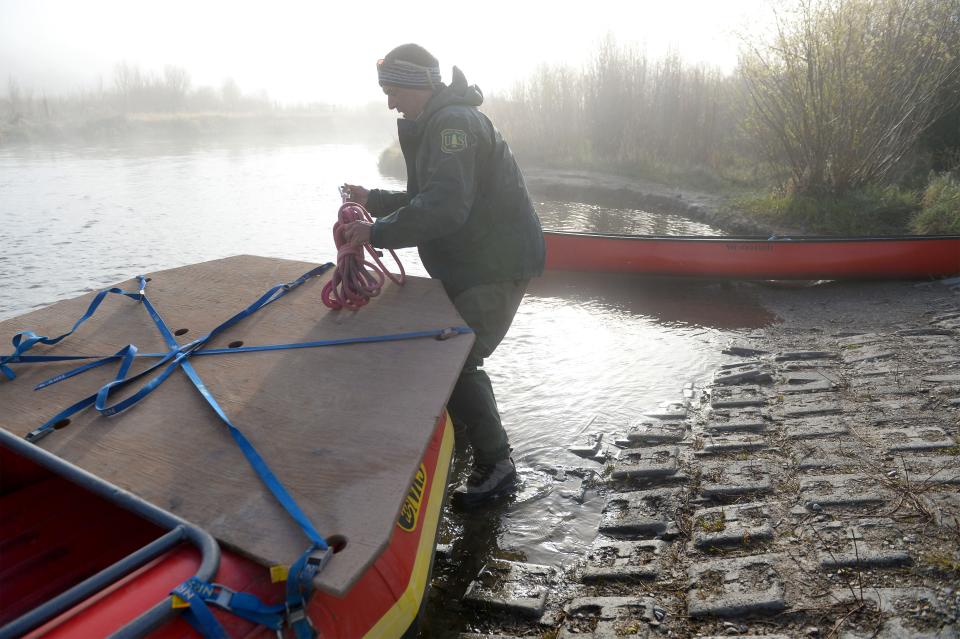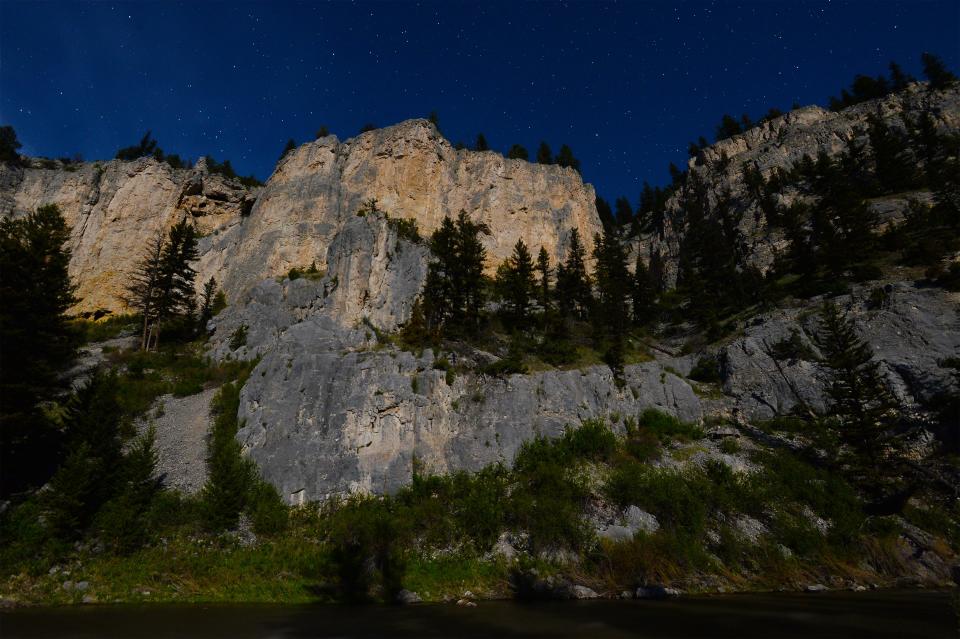Poop, bonuses and short season change Smith River permit system

This remote and tranquil Smith River cuts its way through the remote backcountry of the Little Belt Mountains. The stunning canyon scenery, quiet streamside campgrounds, wildlife and excellent trout fishing attract thousands of floaters each year to a four-day experience that matches any other river expedition in North America, making it a a uniquely Montana experience that most Montanans have on their bucket list.
But getting a permit to float the Smith entails more than simply filling out an application. Since the early 1990s permits to float the Smith have been issued by lottery. The chance of landing a permit is roughly one in 10.
"Last year we had 14,496 applicants and we had 1,470 people draw permits," said Colin Maas, Recreation Manager for the Smith River through Montana Fish, Wildlife and Parks.
Each float permit entitles a recipient to bring up to 15 people along on the 59-mile section of river between Camp Baker northwest of White Sulpher Springs and Eden Bridge, south of Ulm where the Smith flows into the Missouri River. Most groups are much smaller, averaging between four and five people. Maas said that in 2023 roughly 6,256 people made the four-day float, along with another 100 or more river rangers making trips to patrol and maintain the campsites.
"That was our second highest use we’ve ever had," Maas said of 2023. "That goes back to the early 1980s when the department started doing annual reports."
The Smith River Management Act passed by the Montana State Legislature in 1989 directed Montana Fish, Wildlife and Parks to allow compatible public land uses along the river's corridor while maintaining the “natural scenic beauty and solitude” of the Smith River.
River campsites are separated outside of immediate viewing distance and the number of floating permits is limited to a specific number on any given day.
“We do try the manage the river to give people some sense of solitude," said Maas.
This year both the permitting process and the regulations guiding floaters have change significantly. Applications for Smith River float permits opened on January 2 and will continue through February 15. They can be accessed through the Montana Department of Fish, Wildlife and Parks website at www.fwp.mt.gov.
The biggest experiential change coming in the year ahead is that from this day forward all floaters will be required to pack out all their human waste. FWP will be removing all the pit toilets that once donned the backcountry camping sites. Its an extension of the "pack it in - pack it out" principal that now reaches down to the poop you and your guests generate during a four-day trip.
“Removal of the pit toilets will not only help reduce impacts to natural and cultural resources, but also allow more time for the river rangers to focus on other duties, such as public safety and recreation ecology projects like noxious weed control and stabilizing erosion at boat camp landings,” Maas said.
“We’re probably the last river in the United States’ river system you can do multi-day trips on that still provide the pit toilets," he added. "Other rivers in the west have been requiring human-waste pack out for many, many years."
FWP is now requiring all floaters to pack a hard-sided toilet as part of their gear. There are a variety of acceptable options, everything from an old ammo can or a five-gallon bucket with a screw-top lid, to a $1,000 stainless steel portable toilet system specifically designed for rafting expeditions. The department has an informational website that lists acceptable backcountry toilet options.
One option that is not being accepted are human waste disposal bags. These are now common among backcountry hikers and rafting enthusiasts all across the country. Most consist of inner and exterior zip-lock pouches with zip ties, toilet paper and antiseptic wipes. They are frequently referred to as “wag bags,” which are disposable after a hiker or floater has left the trail.
Getting rid of the "wag bags" from thousands of Smith River floaters is the concern that turned FWP officials away from their use.
"We’re talking thousands of these things a week," Maas noted. "We didn’t want people putting them in a dumpster and having the waste company coming in and dumping a whole dumpster full of these things into the back of their truck.”
Instead, FWP has invested in a sanitary waste disposal system called at "SCAT Machine" (Sanitizing Containers with Alternative Technology) available to all floaters at the Eden Bridge take-out point.

"They’re like large industrial dishwashers," Maas said of a dishwasher no one would ever want to use. "When people get to the SCAT machines they’ll hit an activate button and the machine runs through a three-second rinse cycle, then it unlocks the door. You pull the door down and it opens up the hopper. You set your toilet down on the door of the hopper and strap it down. You take the lid off your toilet and put in the back of the SCAT machine and then you close it. The machine flips your toilet upside-down and then it goes over the top of a high-pressure spraying wand that runs through about a 40-gallon cycle where it washes and rinses out your toilet. It takes about two- or three-minutes and then the door unlocks, and you’re done."
The waste is then periodically hauled away and treated in a way similar to how port-a-poddy waste is treated, in a much more eco-friendly and sustainable fashion.
Dealing with human poop is not the only big change at Smith River State Park. FWP has enacted several changes to the application process, changes meant to both add clarity to the process and to increase the chances of long waiting applicants to secure a float permit.
2024 will be the first year in which applicants can buy bonus points along with their Smith River Permit applications. A bonus point is essentially an extra chance you can purchase for the permit drawing. These points accumulate year after year if you are unsuccessful in the drawing.
If your lottery application doesn't hit this year your chances will keep accumulating year after year with each additional bonus point you purchase. The end goal is that long frustrated applicants will eventually accumulate enough bonus points that their float permit applications stand a far better chance of success.

"The changes this year were put into place by HB 846 which told the department that we shall implement a bonus point system," Maas explained. "Basically, we mirrored if off our hunting bonus points. HB 846 also put a cap that no more than 10% of the permits that are sold or issued can go to non-residents. Non-residents are now capped at 10% of the total available Smith River float permits."
Residents can purchase a bonus point for $5 in addition to the regular $15 application fee. Nonresidents can purchase one for $50. The bonus point is applied to your application the year it is purchased. You can apply for a permit through FWP’s online licensing system. For more information on bonus points, click here.
FWP has also shortened the window in which permits to float the Smith River are required. The change is an acknowledgement that by mid-summer low water flows make the Smith nearly impossible to float at all, and that many people were paying for applications they had no realistic possibility of using.
“What’s happened over the past several years is that people will fill up everything in the drawing from April 1 through just about the end of August," Maas said. "The Smith has a short float-season window, and a lot of those permits will just go unused. People will cancel just because of the weather or (stream flows) or a combination of both."
“We’ve shortened the window for the application period so its only going be from April 1 through August 15," he added. “You used to be able to see April 1 through Oct. 31st. Now when applicants go to apply they’ll only see April 1 through August 15th.
"We decided to shorten that window up because of the fact that a lot of those permits are just kind of throw-aways. People would apply for dates in September and October and late August, but there really was no reason to apply for those dates because sometimes there’s not enough water to even float it."
Floaters will also be limited to a single launch day option, where in the past they were given a second and third alternative. Once again, the change is an acknowledgement of the unlikelihood that any second or third option would actually lead to an additional float opportunity.
"The way the random lottery is conducted, it looks at all first launch day choices firs," Maas explained. "Once the system does that pretty much everything is filled up from April 1 through the middle of August. Those second and third launch-day choices kind of gave people a false sense of having more opportunities than they really did. It didn’t really make sense any longer to have second and third launch day choice."

During the occasional good water year, additional float opportunities on the Smith River come up during the fall shoulder season. Intrepid floaters willing to brave the Smith past the middle of August do not need to obtain a permit through the lottery system, but must still register and pay their fees at the Camp Baker put-in site.
“We never close the river due to low flows," said Maas. "If somebody wants to push it and they want to throw down a raft at 100 cfs (Cubic Feet per Second) we don’t try to physically stop them or tell them they can’t do it. It’s just kind of at your own risk."
"Once the typically float season is over, usually in late July, we put Camp Baker on self registration," he added. "We have a metal box there and people can pull out a zip-lock bag that has a registration form and boat tags, maps and instructions on how to self-register, pay their fees and pick their boat camps. You can just drive down to Camp Baker, self-register and put yourself on the river. You don’t need to draw a permit in the lottery drawing for those shoulder seasons when there’s opportunities."
No matter the complexities of obtaining a Smith River float permit, the beauty and serenity of this river is a not-to-be-missed experience.
This article originally appeared on Great Falls Tribune: Smith River floaters must pack out human waste under new regulations

